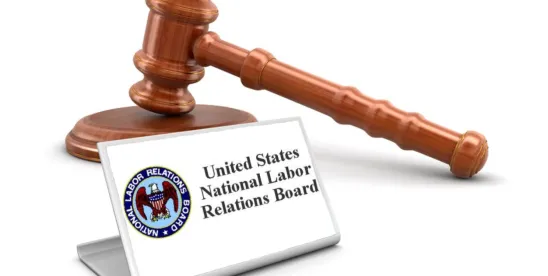The National Labor Relations Board (NLRB) has reinstituted a union-friendly standard for determining whether an employer’s unilateral changes to the terms and conditions of employment violate the National Labor Relations Act (NLRA). Going forward, an employer acting unilaterally must show that the union surrendered its right to bargain through a “clear and unmistakable waiver.” This significantly raises the bar employers must clear to act unilaterally, while providing unions with more avenues to challenge employer actions.
MV Transportation and the ‘Contract Coverage’ Standard
Collective bargaining agreements (CBAs) often contain “management rights” language that permits the employer to act unilaterally in certain areas without first bargaining with a union. This language might be generally phrased (recognizing the employer’s right to direct its employees) or more specific (recognizing the employer’s right to specifically adopt work rules around attendance). If the employer acts unilaterally beyond the scope of the management rights clause, the union could seek to reverse that action as an unlawful unilateral action in violation of the NLRA.
In reviewing whether an employer acted unilaterally, the NLRB had previously adopted the “contract coverage” test in MV Transportation, 368 NLRB No. 66 (2019). Under this test, an employer could implement unilateral changes if the change was “within the compass or scope” of the contract language in the CBA. This standard granted employers additional flexibility in operating their businesses and permitted review of management rights clauses using ordinary contract interpretation principles.
The NLRB Adopts a ‘Clear and Unmistakable Waiver’ Standard
In Endurance Environmental Solutions LLC, 373 NLRB No. 141 (2024), the NLRB overturned MV Transportation and adopted a “clear and unmistakable waiver” test. In Endurance, the management rights clause at issue permitted the employer, a waste management company, to “implement changes in equipment.” The employer informed the union that, pursuant to this language, it intended to install security cameras in its trucks. The union filed an unfair labor practice charge, alleging that the employer was required to first bargain with the union over the installation.
The NLRB agreed with the union. It held that the “clear and unmistakable waiver” test better supported the NLRA’s goals of creating industrial peace through collective bargaining. In the case at issue, the “changes in equipment” language did not refer to surveillance or electrical equipment, and thus the union had not waived its right to bargain over the cameras.
The Endurance Environmental decision highlights the difficulties of drafting a management rights clause specific enough to meet the “clear and unmistakable waiver” standard. Going forward, the NLRB will construe such language extremely narrowly, thereby limiting the ability of employers to act unilaterally.
A Short-Lived Reversal?
The NLRB’s reversal may not last long. With the change of Administration, the NLRB may soon re-examine the Endurance Environmental decision, along with other Biden-era, union-friendly NLRB rulings.
Pending that, however, employers should carefully review their collective bargaining agreements, particularly any broadly worded management rights clauses, to determine if their right to act unilaterally satisfies the current test.





 />i
/>i
